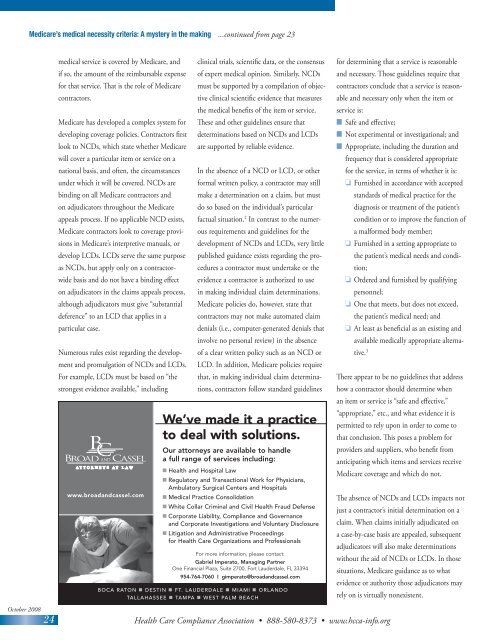Earn CEU credit Cathy Garrey, Connect with your - Health Care ...
Earn CEU credit Cathy Garrey, Connect with your - Health Care ...
Earn CEU credit Cathy Garrey, Connect with your - Health Care ...
Create successful ePaper yourself
Turn your PDF publications into a flip-book with our unique Google optimized e-Paper software.
Medicare’s medical necessity criteria: A mystery in the making ...continued from page 23<br />
medical service is covered by Medicare, and<br />
if so, the amount of the reimbursable expense<br />
for that service. That is the role of Medicare<br />
contractors.<br />
Medicare has developed a complex system for<br />
developing coverage policies. Contractors first<br />
look to NCDs, which state whether Medicare<br />
will cover a particular item or service on a<br />
national basis, and often, the circumstances<br />
under which it will be covered. NCDs are<br />
binding on all Medicare contractors and<br />
on adjudicators throughout the Medicare<br />
appeals process. If no applicable NCD exists,<br />
Medicare contractors look to coverage provisions<br />
in Medicare’s interpretive manuals, or<br />
develop LCDs. LCDs serve the same purpose<br />
as NCDs, but apply only on a contractorwide<br />
basis and do not have a binding effect<br />
on adjudicators in the claims appeals process,<br />
although adjudicators must give “substantial<br />
deference” to an LCD that applies in a<br />
particular case.<br />
Numerous rules exist regarding the development<br />
and promulgation of NCDs and LCDs.<br />
For example, LCDs must be based on “the<br />
strongest evidence available,” including<br />
www.broadandcassel.com<br />
clinical trials, scientific data, or the consensus<br />
of expert medical opinion. Similarly, NCDs<br />
must be supported by a compilation of objective<br />
clinical scientific evidence that measures<br />
the medical benefits of the item or service.<br />
These and other guidelines ensure that<br />
determinations based on NCDs and LCDs<br />
are supported by reliable evidence.<br />
In the absence of a NCD or LCD, or other<br />
formal written policy, a contractor may still<br />
make a determination on a claim, but must<br />
do so based on the individual’s particular<br />
factual situation. 2 In contrast to the numerous<br />
requirements and guidelines for the<br />
development of NCDs and LCDs, very little<br />
published guidance exists regarding the procedures<br />
a contractor must undertake or the<br />
evidence a contractor is authorized to use<br />
in making individual claim determinations.<br />
Medicare policies do, however, state that<br />
contractors may not make automated claim<br />
denials (i.e., computer-generated denials that<br />
involve no personal review) in the absence<br />
of a clear written policy such as an NCD or<br />
LCD. In addition, Medicare policies require<br />
that, in making individual claim determinations,<br />
contractors follow standard guidelines<br />
We’ve made it a practice<br />
to deal <strong>with</strong> solutions.<br />
Our attorneys are available to handle<br />
a full range of services including:<br />
<strong>Health</strong> and Hospital Law<br />
Regulatory and Transactional Work for Physicians,<br />
Ambulatory Surgical Centers and Hospitals<br />
Medical Practice Consolidation<br />
White Collar Criminal and Civil <strong>Health</strong> Fraud Defense<br />
Corporate Liability, Compliance and Governance<br />
and Corporate Investigations and Voluntary Disclosure<br />
Litigation and Administrative Proceedings<br />
for <strong>Health</strong> <strong>Care</strong> Organizations and Professionals<br />
For more information, please contact:<br />
Gabriel Imperato, Managing Partner<br />
One Financial Plaza, Suite 2700, Fort Lauderdale, FL 33394<br />
954-764-7060 | gimperato@broadandcassel.com<br />
BOCA RATON DESTIN FT. LAUDERDALE MIAMI ORLANDO<br />
TALLAHASSEE TAMPA WEST PALM BEACH<br />
for determining that a service is reasonable<br />
and necessary. Those guidelines require that<br />
contractors conclude that a service is reasonable<br />
and necessary only when the item or<br />
service is:<br />
n Safe and effective;<br />
n Not experimental or investigational; and<br />
n Appropriate, including the duration and<br />
frequency that is considered appropriate<br />
for the service, in terms of whether it is:<br />
o Furnished in accordance <strong>with</strong> accepted<br />
standards of medical practice for the<br />
diagnosis or treatment of the patient’s<br />
condition or to improve the function of<br />
a malformed body member;<br />
o Furnished in a setting appropriate to<br />
the patient’s medical needs and condition;<br />
o Ordered and furnished by qualifying<br />
personnel;<br />
o One that meets, but does not exceed,<br />
the patient’s medical need; and<br />
o At least as beneficial as an existing and<br />
available medically appropriate alternative.<br />
3<br />
There appear to be no guidelines that address<br />
how a contractor should determine when<br />
an item or service is “safe and effective,”<br />
“appropriate,” etc., and what evidence it is<br />
permitted to rely upon in order to come to<br />
that conclusion. This poses a problem for<br />
providers and suppliers, who benefit from<br />
anticipating which items and services receive<br />
Medicare coverage and which do not.<br />
The absence of NCDs and LCDs impacts not<br />
just a contractor’s initial determination on a<br />
claim. When claims initially adjudicated on<br />
a case-by-case basis are appealed, subsequent<br />
adjudicators will also make determinations<br />
<strong>with</strong>out the aid of NCDs or LCDs. In those<br />
situations, Medicare guidance as to what<br />
evidence or authority those adjudicators may<br />
rely on is virtually nonexistent.<br />
October 2008<br />
24<br />
<strong>Health</strong> <strong>Care</strong> Compliance Association • 888-580-8373 • www.hcca-info.org

















